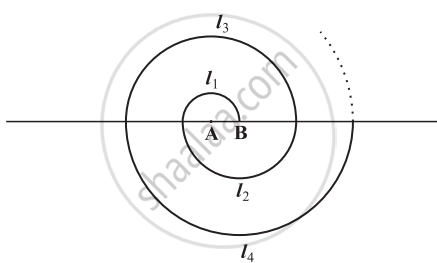Advertisements
Advertisements
प्रश्न
The fourth term of an A.P. is 11 and the eighth term exceeds twice the fourth term by 5. Find the A.P. and the sum of first 50 terms.
उत्तर
For an A.P.
t4 = 11
`\implies` a + 3d = 11 ...(i)
Also, t8 – 2t4 = 5
`\implies` (a + 7d) – 2 × 11 = 5
`\implies` a + 7d – 22 = 5
`\implies` a + 7d = 27 ...(ii)
Subtracting equation (i) from equation (ii), we get
a + 3d = 11
a + 7d = 27
– – –
– 4d = – 16
d = `(- 16)/(- 4)`
`\implies` d = 4
Substituting d = 4 in equation (i), we get
a + 3d = 11
a + 3 × 4 = 11
`\implies` a + 12 = 11
`\implies` a = –1
∴ Required A.P. = a, a + d, a + 2d, a + 3d, ....
∴ a = –1
∴ a + d = –1 + 4 = 3
∴ a + 2d = –1 + 2(4) = –1 + 8 = 7
∴ a + 3d = –1 + 3(4) = –1 + 12 = 11
Sum of first 50 terms of this A.P.
=`50/2 [2 xx (-1) + 49 xx 4]`
= 25[–2 + 196]
= 25 × 194
= 4850
APPEARS IN
संबंधित प्रश्न
In an AP given d = 5, S9 = 75, find a and a9.
A spiral is made up of successive semicircles, with centres alternately at A and B, starting with centre at A of radii 0.5, 1.0 cm, 1.5 cm, 2.0 cm, .... as shown in figure. What is the total length of such a spiral made up of thirteen consecutive semicircles? (Take `pi = 22/7`)

[Hint: Length of successive semicircles is l1, l2, l3, l4, ... with centres at A, B, A, B, ... respectively.]
Find how many integers between 200 and 500 are divisible by 8.
Find the three numbers in AP whose sum is 15 and product is 80.
Choose the correct alternative answer for the following question .
In an A.P. first two terms are –3, 4 then 21st term is ...
Fill up the boxes and find out the number of terms in the A.P.
1,3,5,....,149 .
Here a = 1 , d =b`[ ], t_n = 149`
tn = a + (n-1) d
∴ 149 =`[ ] ∴149 = 2n - [ ]`
∴ n =`[ ]`
The sum of first n terms of an A.P. is 5n − n2. Find the nth term of this A.P.
A sum of Rs. 700 is to be paid to give seven cash prizes to the students of a school for their overall academic performance. If the cost of each prize is Rs. 20 less than its preceding prize; find the value of each of the prizes.
Find the sum of those integers from 1 to 500 which are multiples of 2 or 5.
[Hint (iii) : These numbers will be : multiples of 2 + multiples of 5 – multiples of 2 as well as of 5]
Find the sum of the integers between 100 and 200 that are not divisible by 9.
